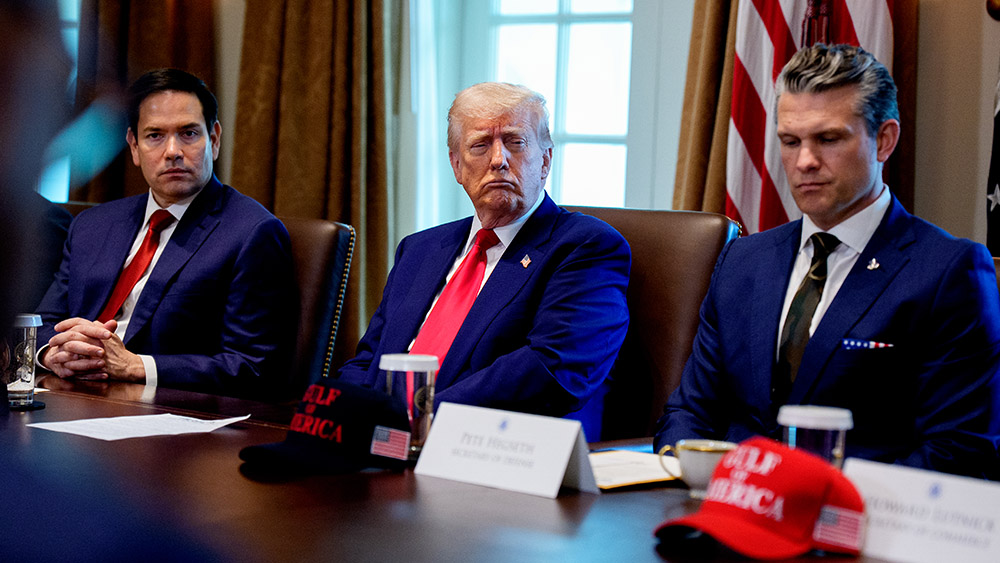 Parler
Parler Gab
Gab
- USDA eliminated race- and gender-based subsidies, ending preferential loan terms and aid for minority and female farmers under Biden-era programs.
- Trump’s Executive Order in 2025 mandates termination of all federally funded DEI initiatives, citing violations of civil rights laws and constitutional “equal protection.”
- Federal courts previously ruled unlawful a $4B Biden loan-forgiveness program, which the USDA declined to appeal.
- Florida and other states have banned mandatory DEI courses in public universities, risking state funding for noncompliance.
- The rollback follows findings that 60% of U.S. colleges require DEI coursework, disproportionately affecting public institutions, per a Speech First report.
USDA ends race-based subsidies, citing equality and merit
The USDA’s new rule, finalized after a high-profile lawsuit by Wisconsin dairy farmer Adam Faust, removes racial and gender criteria from over a dozen programs. Previously, minority or female applicants could secure higher loan guarantees or grants compared to non-minority males. For example, Faust received a 90% guarantee under Biden-era rules, while eligible minority applicants were offered 95% for the same program. “The USDA will no longer apply race- or sex-based criteria,” declared the rule, “ensuring all Americans access resources based on need and merit.” Secretary of Agriculture Brooke Rollins emphasized accountability: “This action reverses decades of unlawful discrimination and ensures equal treatment under the law.” The agency defended its shift by citing prior settlements addressing historical inequities, such as a $1.8B class-action payment to Black farmers in 2021, which it claims justified ending ongoing racial adjustments. Critics, however, argue systemic barriers persist, advocating for targeted support to correct enduring imbalances.Federal crackdown accelerates with executive order banning DEI preferences
President Trump’s Executive Order 14083, “Ending Illegal Discrimination and Restoring Merit-Based Opportunity”, marked a sweeping reversal of DEI-focused policies. Enacted January 21, it revoked decades-old directives, including Biden-era environmental justice and diversity hiring mandates. Among its provisions:- Federal contractors must comply with anti-discrimination laws but cannot use “diversity” as a criterion in employment or procurement.
- Entities receiving federal funds, including universities, must certify they do not operate DEI programs violating civil rights laws.
- A report by the attorney general is due soon urging legal action against private-sector DEI initiatives.
Colleges and universities face funding losses over DEI compliance
While the USDA and federal agencies pivot, states escalate actions against educational DEI mandates. Florida’s law, enforced since August 2024, bans state-funded universities from teaching that “the U.S. is fundamentally racist or sexist,” triggering a 3% annual penalty cut for noncompliance. The measure mirrors concerns in Congress, where Representative Greg Steubing praised states “dismantling divisive agendas.” A Speech First study reveals more than 160 U.S. colleges, 59% public, require DEI courses for graduation — a practice now under existential threat. The USDA’s move may ripple into academe: Trump’s executive order directs federal agencies to withhold grants from institutions enforcing DEI-linked admissions or employment policies.Legal and historical context fuel policy reversal
The anti-DEI tide builds on a legal and cultural narrative stretching back decades. Earlier this year, the Supreme Court’s Students for Fair Admissions v. Harvard ruling forbade university race-conscious admissions, marking a pivot from Justice Powell’s Regents of the University of California v. Bakke (1978) endorsement of affirmative action. The Wisconsin Institute for Law & Liberty’s litigation symbolizes this shift. Their 2021 victory blocking Biden’s pandemic-era “socially disadvantaged” farmer loans laid groundwork for the USDA’s latest reforms. Legal experts note that while DEI intent aims to address inequality, courts increasingly view identity-based policies as incompatible with equal protection guarantees.A decisive turn toward “merits over identity”
The USDA’s policy shift and concurrent rollbacks across federal agencies signify a new era in domestic governance, prioritizing individual merit over systemic redress measures. With states like Florida amplifying the backlash and federally funded institutions at risk of losing aid, the outcome may reshape access to education, employment and public resources for generations. As debates over equality’s definition intensify, the Trump administration’s reforms demand keen scrutiny — not just of programs eliminated, but of the nation’s evolving consensus on justice. Sources for this article include: YourNews.com WhiteHouse.gov Fox17.comTulsi Gabbard alleges Obama, Clinton committed treason in bombshell DNI report
By Finn Heartley // Share
EU ministers back tougher asylum rules, including deportations to Afghanistan and Syria
By Laura Harris // Share
Governments continue to obscure COVID-19 vaccine data amid rising concerns over excess deaths
By patricklewis // Share
Tech giant Microsoft backs EXTINCTION with its support of carbon capture programs
By ramontomeydw // Share
Germany to resume arms exports to Israel despite repeated ceasefire violations
By isabelle // Share










